Good keyword research is the basis for any SEO strategy. After all, the first step in reaching your audience is to find out what they are looking for.
When we think of online stores, these words have a great impact on the optimization of product and category pages.
If your business is an eCommerce, there are some peculiarities and some different ways to find the best keywords to use in your domain.
Generally, keyword guides focus on “informational” searches. In other words, those are searches that answer questions from the reader, such as “what is” and “how to”.
These keywords have an important role to play in eCommerce strategies, especially for brands that invest in content creation and blogs.
However, “transactional” searches are the most common for eCommerces, because they focus on the purchase of products or any other type of transaction.
Therefore, an eCommerce keyword research will be built around words related to products.
Before learning how to find them, we’ll look at some important tips to help you discover and invest in the right keywords.
Keyword Volume: Deliver What They Want
It is impossible to do a keyword search without considering the volume of searches.
This is usually the first thing that someone looks for when defining the terms to use on a website.
After all, it could not be any other way.
What is the point of choosing a term that has a purchase intention, very high relevance, and low competition if no one is looking for it?
That is why the search volume is important.
However, remember that the volume varies from market to market, word to word, product to product.
In some markets, you will find searches with a monthly volume of more than 100K. In others, you will find a maximum of 1K searches.
Understand your market well, and use terms from your own niche as a comparison.
The search volume is very important, but it is crucial not to get too attached to it.
Keyword Difficulty: the Importance of Being Realistic
Another important tip for finding keywords for your eCommerce is to know how to pick your battles.
We often base our words only on the volume of searches. After all, we want to rank for the most searched words in the market.
However, this leads us to invest a lot of effort into searches that will not achieve good results.
It is very important that you invest in keywords that have a realistic chance to rank.
SEMrush (and any other good keyword tool) has a metric called Keyword Difficulty.
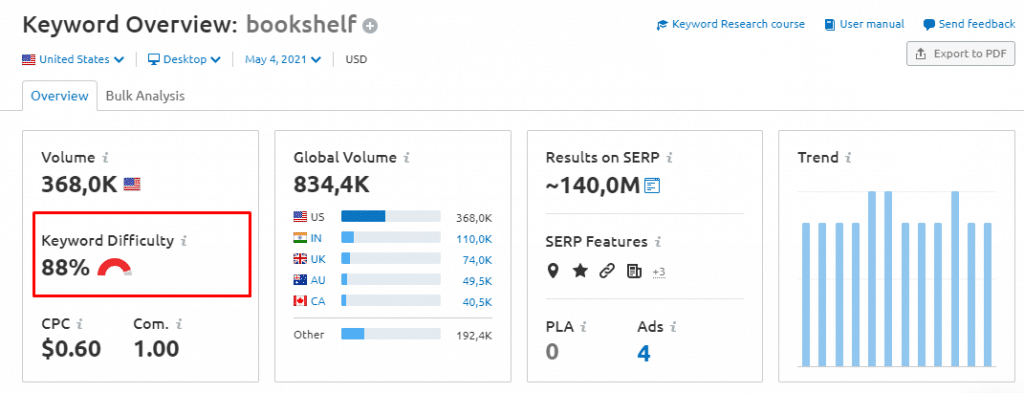
As you can see, the keyword “bookshelf” has a difficulty of 88%, which is a high difficulty.
In this case, we can search among the variations, long-tail keywords and related words for options that have less difficulty and competition.
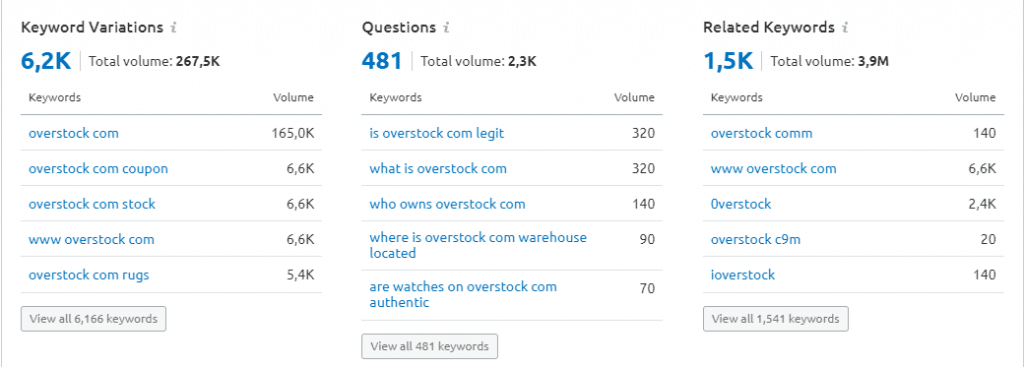
It is important to note that you should not feel stuck to those values, as they can vary from market to market.
However, they are an aid in the choice of words.
Always check which pages are ranking for that keyword. If you notice that there are sites with the same or just slightly greater authority than yours, it is worth investing in those keywords.
Therefore, it is important to know how to pick your battles.
Imagine that you own a computer dealer. Definitely, the first word to invest in would not be “laptops”.

Simply look at the competition that you would have in the SERPs!
Keyword Intent: It’s About What They Want to Find
SEO is not about what people are looking for, but about what they want to find.
Knowing the results volume and what people are looking for is important, but the main thing is to understand the intention they have with each search.
Many of the keywords we find have informational intentions, for example, “how to put a puzzle together”. These searches are interesting for blog and explanatory pages, but not for commercial pages.
So imagine that your online store sells puzzles.
You will soon want to rank for the word “puzzle” — after all, there are more than 450K monthly searches.

However, it is a search without a definite intention.
The SERP itself switches between online games, stores, Wikipedia and others.
Now, see the highlighted search below: 1000 piece puzzles.
The person most likely wants to buy a 1000-piece puzzle, since even the size is detailed. The most interesting thing is that the difficulty of this keyword is much lower.
Even though the search volume is also much lower, this is a more valuable keyword for a business.
You can still find more detailed longtail keywords with commercial intent and less competition:

Therefore, paying attention to the search intent will help you pick the best battles.
Ecommerce Keyword Research: How to Select Good Keywords?
Now that we know what to look for when selecting our keywords, it’s time to learn how to find them step by step.
1. Using Amazon Suggest
Regardless of the market in which you work, most likely Amazon is your competitor.
It is difficult to think of anything that you will not find there.
The positive side is that we can explore the largest marketplace in the world to help us find good keywords for our business.
We are already used to Google Suggest to find keywords for our site, right? The idea with Amazon Suggest is pretty much the same.
However, at Amazon, you will already be looking for keywords related to products that are optimized to attract and guide buyers.
This makes Amazon Suggest a more optimized choice than Google for eCommerce.
Let’s go through it step by step.
When you perform a search on Amazon, as well as Google, the page will display a series of suggestions based on the keyword you searched for.
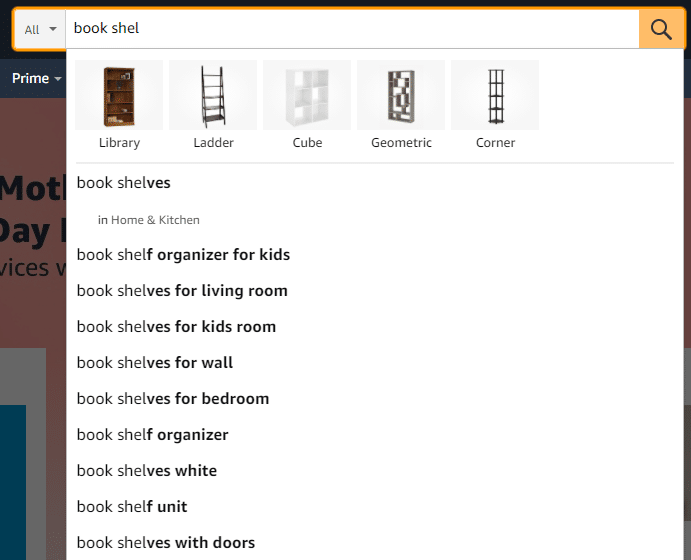
Here, we can see several options for long-tail keywords suggested by Amazon.
They are usually relevant words and reveal an intention to buy since they are based on popular searches and products.
Long-tail keywords have a higher conversion potential and generally have less competition than broader terms that generate more traffic.
You can repeat the same process with the other main keywords from your site.
Amazon categories
In addition to using Amazon Suggest, you can utilize their categories and organization as a reference.
A very common mistake with online stores is to worry too much about the keywords on the product pages, and then neglect to organize them by categories.
Often the process is done according to the store owner’s personal preferences, which is bad.
Categories are also very important pages for converting customers and attracting traffic, especially when we think in more general terms.
Therefore, using the largest marketplace in the world and learning from their organization and the keywords they use for their categories, can have a big impact on your strategy.
The first step is to find the Amazon category that competes with your business.
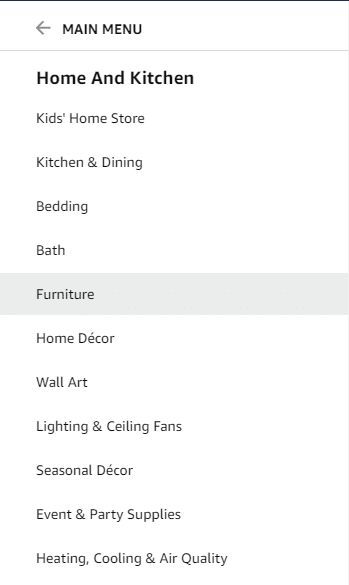
If you can’t find an ideal category, you can search for your product and identify where it is located.
Let’s see where a bookshelf fits:
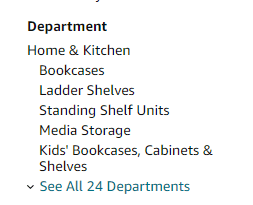
The products are in the Home & Kitchen category, so we can visit it and see what keywords are used in this department’s organization.

Now you can go deeper and deeper into divisions and organizations to discover more details and keywords that they use.

See the variation of subcategories within the Furniture department.
Thinking about the current context, let’s check out what they have for Home Office:

And we can go further. If we select Home Office Chairs, we will discover even richer keyword options:
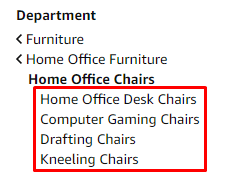
All of these terms can be variations and different keywords for you to use for your products and organizing your website into categories that are sought after by your audience.
Boosting your searches through Amazon
In addition to manual searches on Amazon, as shown above, you can deepen these searches using a tool called Keyword Dominator.
This tool has search features for Google, YouTube and Amazon:
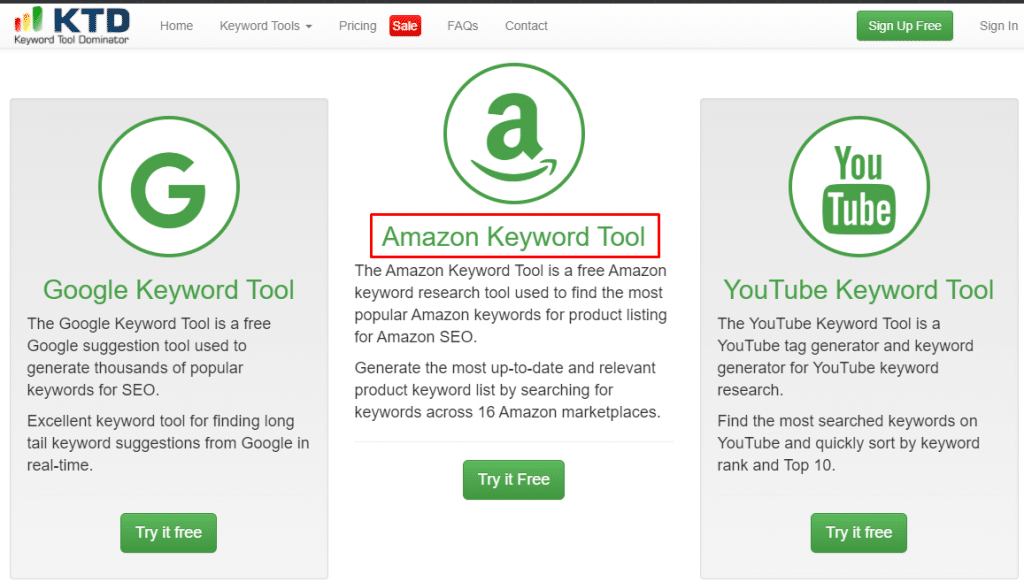
As a comparison, we will do the same search that we did directly on Amazon, but in the tool:
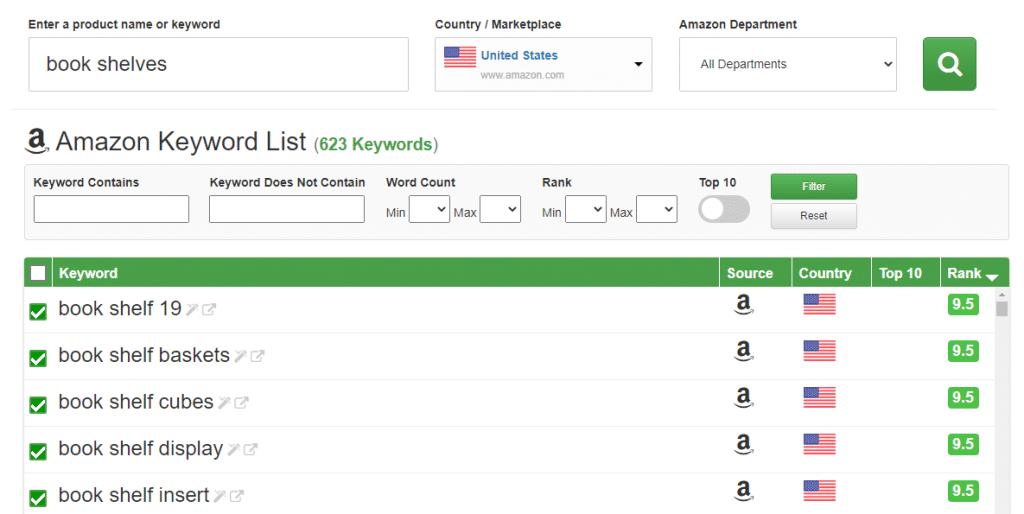
Note that we received more than 600 keyword suggestions, far more than we saw on Amazon Suggest.
That is why Keyword Dominator can assist you with rich suggestions with high variation.
2. Stealing your competitors’ top keywords
Here it is important to say that you can and MUST repeat the processes of the two previous topics on your competitors’ websites.
It is essential to observe what they are doing best, in order to optimize our website and surpass them — especially for SERPs where they appear in the top positions.
In addition to this manual research, you must deepen your comparison.
Surely, you know who your main competitors are, and that is where we’ll start.
For that, we will need to use a keyword tool. Today there are several quality products on the market for that. We will use SEMrush for the following examples.
We will continue to base the research on the keywords we used previously and analyze the following domain:

Now the goal is to identify which keywords your competitor is ranking for on Google.
For that, we will go to the “Organic search” feature:
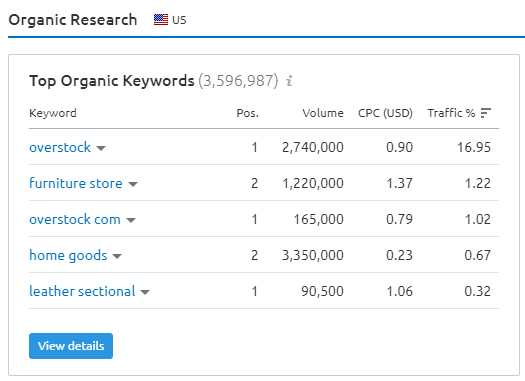
After clicking on “View details”, we will see the list of all the keywords that our competitor ranks for on Google:
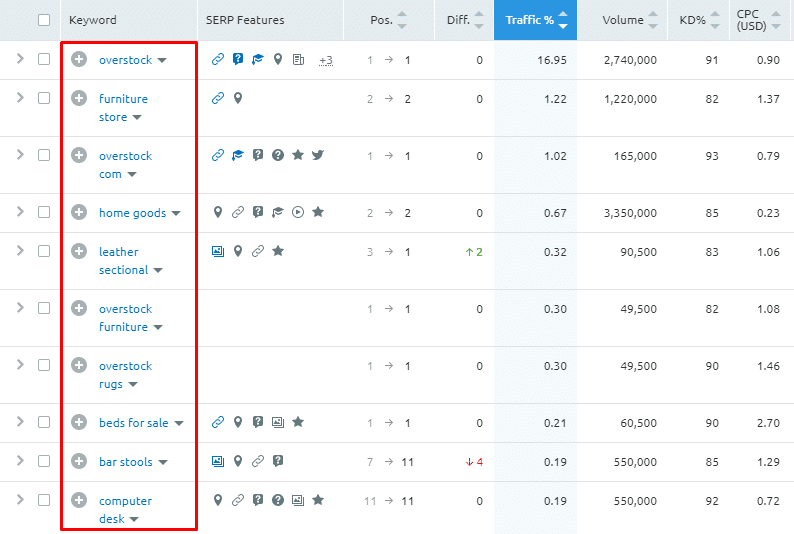
You can repeat the same process with other competitors, remembering to observe the difficulty, volume and search intent.
SEMrush also allows you to find competitors that you didn’t even know you had.
Usually, when we think of competition, we think of business competitors. However, SEMrush points out organic competitors, that is, competitors ranking for similar keywords.
Thus, you increase the range of sites you can use to discover good terms for your own.
To do this, just click on the “Competitors” tab:

And then check out the extensive list of keyword competitors:
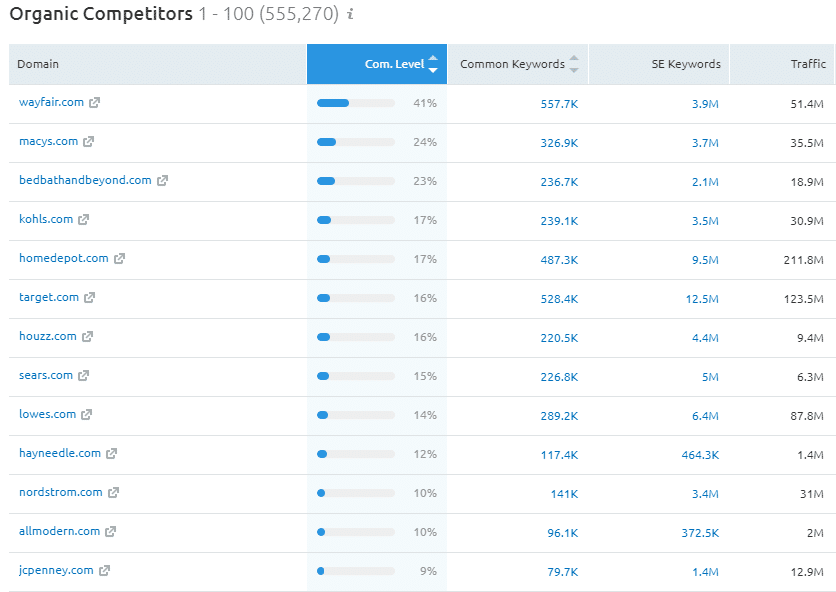
Going deeper into the competition analysis
In addition to the options given above, there is a very rich way of identifying new keywords for your site by analyzing your competitors.
Within the competitive analysis features, you will find “keyword gap”:

With this tool, you can select your domain and your competitors’ domains to compare them.
The goal here is to:
- Find keywords that your competitors have and you don’t.
- Find keywords you have, but your competitors rank better.
You can compare up to four domains simultaneously.

For this example, we will use only two domains.
After making the comparison, you will see a list with all the keywords from both domains.
SEMrush itself already gives you the filter options, making it easier for you to find the best terms.
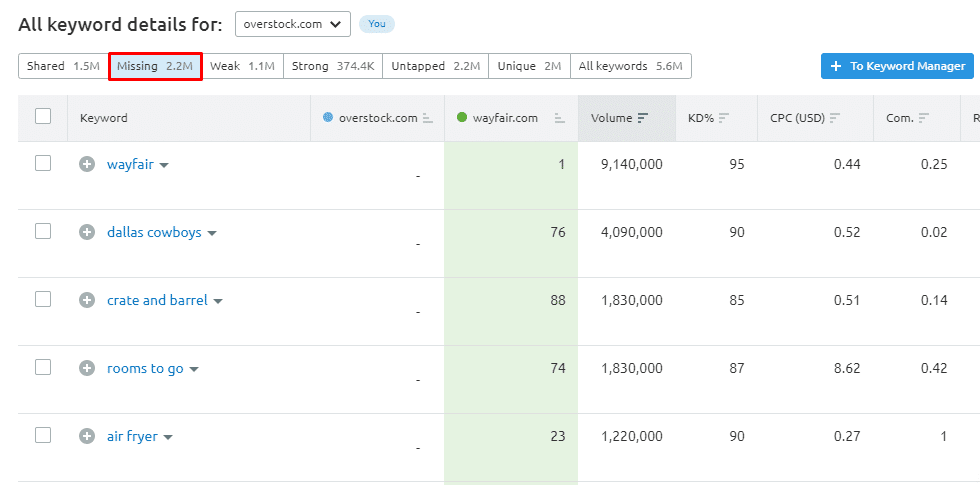
In this example, we selected only the “missing” filter to identify the words that our competitor has that we do not.
This is an excellent opportunity for you to identify gaps in your keyword strategy and find effective keywords to reach new people.
In addition to being a way for you to improve your business, you also take away a competitive advantage that your competitor had against you.
3. Discovering keywords on Wikipedia
If there is a site capable of answering almost any question we could have, Wikipedia is it.
And if your question is “what are the best keywords for my eCommerce”, your answer is also there!
Of course, for Wikipedia to have so much content on so many topics, it takes a lot of organization.
Like any eCommerce, Wikipedia is also divided by keywords and categories for its various topics.
The first step is to search for a product or category name from your eCommerce. Let’s say you have a store that sells headphones.
Let’s look for that term and look for words, variations of terms and phrases that make sense for the products in your store:
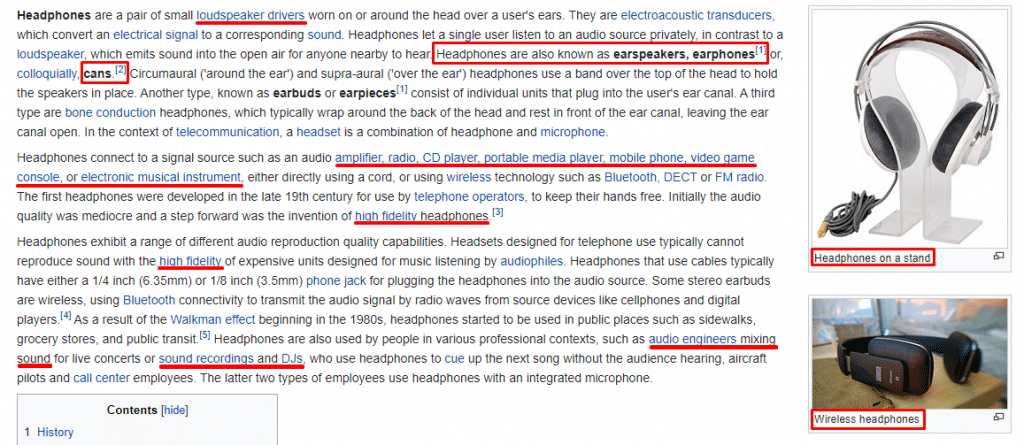
In addition to finding different keywords, we have good suggestions for variations of terms to use on product pages.
It is also important to note that some of the highlighted terms may be important data that is useful to put in the product descriptions, increasing the chances of ranking for the keywords and bringing the most relevant information to the reader.
Also, be sure to look at the content box, where we can get great word ideas, especially with categories in mind.
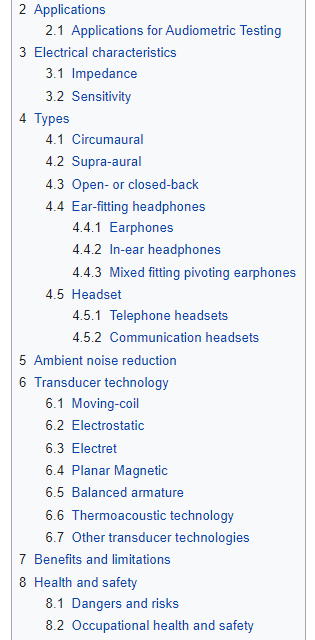
Wrap Up: eCommerce Keyword Research Done Right
Finding the right keywords for your eCommerce website isn’t difficult as long as you keep our tips in mind.
Online stores definitely have their peculiarities, but now you know the tools to adapt searches to your business.
Still feel as though your eCommerce SEO is a little lacking?
Then take our maturity assessment to help diagnose your current SEO strategy!




![[ROCK NA] [EBOOK SEO] Complete Guide](https://rockcontent.com/wp-content/uploads/2024/06/banner_Search-Engine-Optimization.png)






